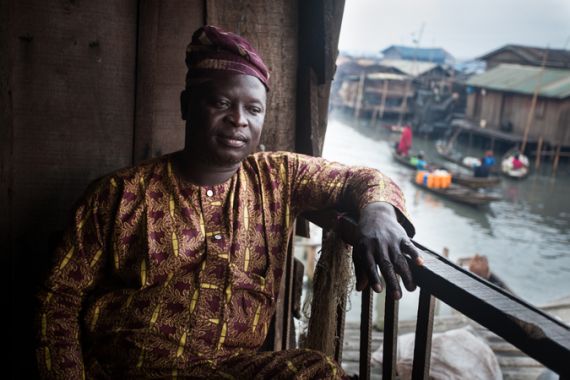
Nigeria: Fishermen and chiefs
The baale of Makoko is challenging negative stereotypes of Lagos’ economically productive overwater settlement.
As part of the ‘Where I live’ series, the Al Jazeera Magazine asked people from around the world how their lives have been influenced by where they live. Meet Emmanuel, who is the chief of the sprawling Lagos slum.
Emmanuel Shemede’s family has lived in Makoko, a sprawling settlement on the shallow lagoon that sits at the heart of Nigeria’s most populous city, for 125 years.
In 2005, he became a baale – or chief – of his Lagos community, succeeding his father who had by then grown too old and frail to rule. The older Shemede, born, like his children, in Makoko, eventually died last year, aged 115.
To select Shemede as the new baale, the kingmakers depended on Ifa, a centuries-old system of divination native to the Yoruba people of western Nigeria, which has spread, over the centuries, across West Africa and to South America and the Caribbean.
“Ifa chose me. Ifa can pick anybody. It isn’t hereditary,” says the baale – the purple fila on his head matching the splashes of purple on his patterned ankara buba and sokoto. He is not a slim man, but he is not fat either – the trademark paunch that in Nigeria verifies chiefdom, is missing. Now in his 60s, he could pass for someone much younger.
As for many in this part of the country, syncretism is a way of life for Shemede. He is therefore also a Christian, of the Celestial Church of Christ affiliation – a common denomination in Makoko – and attends the Baptist Church on the ground floor of his single-storey home. He donated the space to the church at the prompting of some of his white missionary friends. “There’s no religion that isn’t represented in Makoko,” he says.
Newspaper reports often describe him as the baale of “Makoko-on-water”, to distinguish the floating community from the coterminous one that sits on dry land. But when asked for his official chieftaincy title, he says he is the baale of “Adogbo Village”.
There are other baales among the lagoon community – Shemede says there are about 30 in Makoko and its environs who meet monthly as a council – but he is the most prominent of them all. “Baales are like governors for the obas [kings],” Shemede explains. “Kings need to have baales, the way presidents have governors.”
But being baale is not a full-time job for Shemede, who continues to earn a living in much the same way as the other men of this community. “I’m a fisherman. I was fishing before I became baale. I’m still fishing. I have to get into the lagoon to fish and make a living,” he says.
As baale it is his duty to settle minor disputes; the more serious ones go to the police. There are matters of individual welfare to be attended to, and it also falls on him to lead negotiations with the government, especially in matters regarding Makoko’s survival, as the settlement continues to face threats of demolition.
“The fear before was that we would be chased [from the area]. Now they’ve said they’ll help us improve this place,” Shemede says about the government.
From a balcony overlooking Makoko, the baale can see every boat that makes its way past, heading for the lagoon. He suspects that the constant stream of unsightly images from the settlement may in part be responsible for the government’s bid to evict the population, so is weary of camera-wielding outsiders touring the slum and keen to stress just how healthy and economically viable it is.
“No one visits Makoko without my knowledge,” he says.